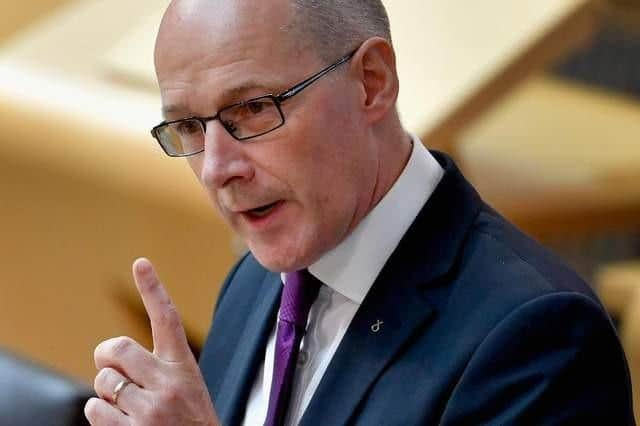Falkirk Council: Labour group leader sends open letter to John Swinney over 'lack of funding'
and live on Freeview channel 276
In an open letter to finance secretary John Swinney, Councillor Anne Hannah told him that people in Falkirk are facing “loss of jobs and loss of services vital to all our citizens”.
And Ms Hannah, who was newly elected as a councillor in May, warned Mr Swinney that she “cannot accept” that the Scottish Government is not able to offer councils more help to face the challenges ahead.
Advertisement
Hide AdAdvertisement
Hide AdShe said: “I stood for election because I wanted to make a difference in the Falkirk Council area, and I wanted to improve the lot of the people who live in it. I have been appalled at how little we are able to achieve due to the chronic lack of funding for Local Government, and I find that all 32 councils in Scotland are in much the same situation.”


She acknowledges the many problems that are not of the Scottish Government’s making: the global pandemic, Brexit, a global economic crisis and Russia’s invasion of Ukraine are all creating financial votality.
But, she added: “Nevertheless, the Scottish Government provides approximately 79 per cent of the Council’s funding so only the Scottish Government can resolve this crisis for us.”
Ms Hannah used figures from the Scottish Government’s own website that show while its funding has increased by 3.1 per cent, local government finance reduced by 2.4 per cent between 2013/14 and 2021/22.
Advertisement
Hide AdAdvertisement
Hide Ad

Falkirk Council’s budget gap over the next five years is around £82 million.
“I cannot over emphasise the scale of the problem we face,” the councillor said. “We cannot deliver a balanced budget except by further slashing services which have already been cut year on year.”
The previously announced “flat cash settlement” – which will see councils get no rise in income over the period 2022 to 2026 would be challenging enough, said Ms Hannah. But it is coming at a time when councils are also facing rising inflation and soaring costs for fuel and utilities as well as construction costs.
There is also an ongoing pay award demands and despite Mr Swinney’s recent offer of £140 million to councils to fund a pay rise for council staff, Ms Hannah does not think this will be anything like enough.
Advertisement
Hide AdAdvertisement
Hide AdShe also points out that ring-fenced cash – which has to be spent on set projects – means the council has no control over much of the budget.
“For those parts we do control, we are faced with the necessity of cutting essential services for our constituents, at a time when the current high level of inflation is biting on their budgets,” she said.
“Officers are drawing up savings proposals, but the options are limited due to the years of cuts already imposed, and the consequences of some of the options are loss of jobs, loss of services vital to all our citizens, and loss of services which can mean life or death to some of the most vulnerable people in our wards.”
“I cannot over emphasise the scale of the problem we face.”
A Scottish Government spokesperson said: “The Scottish Government is treating councils fairly and providing a real terms increase of 6.3 per cent to local authority budgets this year. This comes against a cut to the Scottish Government’s overall budget of 5.2 per cent in real terms, due primarily to UK Government funding reductions.
Advertisement
Hide AdAdvertisement
Hide Ad“Council staff play a crucial role in our communities as we rebuild the economy following the pandemic. Following constructive discussions with COSLA leaders, and notwithstanding the financial impact on the Scottish Government’s fully committed budget, the Scottish Government is contributing a further £140 million of recurring funding to support COSLA to make a revised pay offer to the local government workforce.”
In 2022-23, Falkirk Council will receive £343.4 million to fund vital local services, which equates to an extra £28.9 million or an additional 9.2 per cent compared to 2021-22.
Councillor Cecil Meiklejohn, the SNP leader of Falkirk Council, replied to Ms Hannah, saying that she was “disappointed that the opportunity for a cross-party approach has been missed”.
She urged Ms Hannah and the Labour group to send a similar letter to the UK Government, urging it to use its powers to help councils continue to deliver their services in the face of rising costs.
Advertisement
Hide AdAdvertisement
Hide AdShe said: “I’m also saddened that this position has been directed fully at the Scottish Government, given that real progress has been made in partnership by rolling out 1140 hours of childcare benefiting in-work parents and single-parent families, as well as providing significant support to hard-pressed communities across the pandemic – a difficult period from which we are still recovering.
“It’s true to say that the Scottish Government sets the budget for local government. However, the only national government with the ability to raise funds and borrow when appropriate is the UK Government.
“I will continue to engage with COSLA and the Scottish Government as Leader of Falkirk Council to get the best possible outcome so that we can support our most vulnerable citizens and under-pressure communities. It is in that spirit that we would work with all parties to write a similar letter to the UK Government to use all its powers to ease pressure immediately by addressing the rising costs of energy, the consequences of inflation, the impact this is having on our communities, while urging them to commit increased funding for our vital public services.”
In turn, Ms Hannah said she is happy to work with other parties to send a letter and is keen to work collaboratively to address the crisis.
